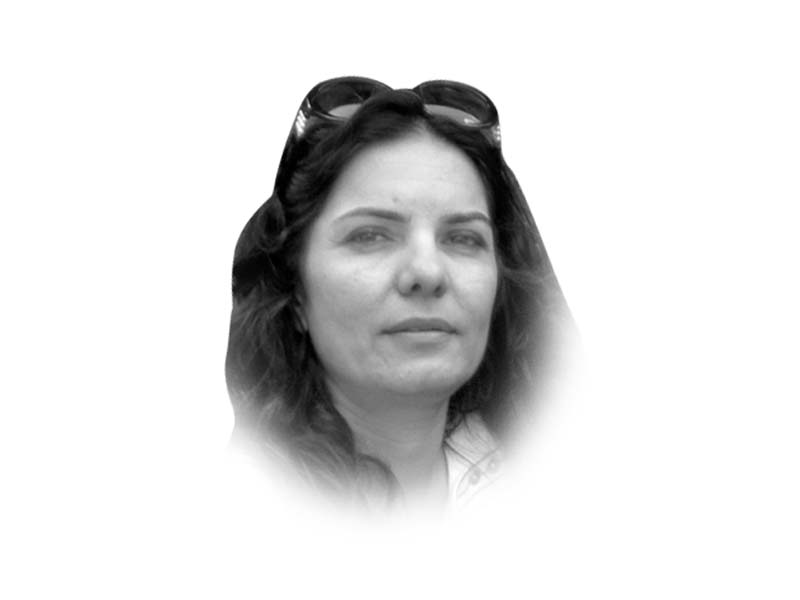
Pakistan’s Jamaat-e-Islami leaders have condemned the recent death sentence awarded to the Bangladeshi war criminal Maulana Dilawer Saeedi not because our Islamist party is anti-capital punishment but, as the deputy president JI of Punjab reportedly insisted, the sentenced leaders of the razakars (pro-Pakistan militias) were innocent. There was no irony in his objection over the silence of “all human rights organisations” on this travesty of justice.
To their credit, a few sole voices in Pakistan (and the music band, Laal) have attempted to crack the apathy in our media over the Bangladesh war crime proceedings and subsequent youth-based Shahbag protests for justice over the last few months. It is always important to interrupt nationalist narratives and pursue historical correctives, particularly if one’s own role has been that of the hostile aggressor and perpetrator. However, the politics of the ongoing Shahbag movement are perhaps larger than a Pakistani apology and beyond 1971. More than stressing over closure and the end of history, the youth-led Shahbag protest is demanding the maximum punishment for war criminals and the de-recognition of the Jamaat-e-Islami, and is therefore, more futuristic in its bent. The intersectional questions of religion and politics will determine not just the future of Bangladesh but also those of (post-Arab uprising) Middle Eastern countries as well. Can Pakistan move beyond its moping disinterest, defensive nationalism and/or theocratic identity politics to learn from this moment?
It is important to point out that Bangladesh is polarised on the nature, politics and narrative emerging from Shahbag itself, especially on the illiberal demands of capital punishment, the fairness of the trials themselves and indeed, the opportunism of the governing Awami League to secure its electoral future through populist moves against the Jamaat. The League is also suspected of fuelling the protest movement — an allegation that undermines its spontaneity.
On the other hand, the outing of Rajib, one of the founding activists and chief blogger of Shahbag, as an atheist by portions of the media resulted in campaigns accusing the protest of being an anti-Islam movement. His subsequent murder has been blamed on Jamaat activists. Women who are spearheading the movement have been maligned as “loose and immoral” for occupying public space and the Jamaat defence has been ably supported by well-funded, US-based lobbies. The opposition and Islamic parties have launched a counter-movement and, amidst escalating violence, there has been a re-visitation of discussions around the relationship between liberalism, secularism, religion and politics in Bangladesh and its implications for other Muslim majority contexts.
Central to these concerns are the limitations of a politics that rests on liberal squeamishness compared to the blatant and aggressive posturing and response by the Islamist groups. The most vivid symbol of such arrogance has been read in the V-sign flashed by indicted Jamaat-e-Islami leader Abdul Kader Mullah (Butcher of Mirpur) as he exited the war crimes tribunal in February after being awarded a life sentence rather than the death penalty. Liberals are constantly accused of reneging on liberal values by setting up “Good”/“Bad” Muslim binaries and “demonising” Islamists through their criticism of their politics but when Islamists wish to co-opt liberal rights for themselves in exchange for inflicting limitations, restrictions and hegemonic interpretations on others, there is silence.
External commentators can afford to support the Shahbag movement “in spirit” while maintaining a high moral ground over the demand of capital punishment or the banning of the Islamist party — a case of classic fence-sitting. However, the fact is that the Shahbag vanguard has been unapologetic about challenging and reclaiming the non-democratic street power wielded by the Islamists. When Islamists lose elections but dominate the street, much is made of their populist credence but when liberals do so, their legitimacy is questioned and standards elevated.
Historically, the Jamaat-e-Islami in Bangladesh, like its Pakistani counterpart, has suffered electoral ignominy. The call for a ban of the Islamist party is based on the argument that the constitution of the JI is not in line with that of Bangladesh’s constitution. The line of reasoning, therefore, is that any ban is pro-Bangladesh, not anti-Islam and not about singling out the Jamaat but making sure the same law applies to all. However, it does mean that a Constitution has to be clear on its principle of secularity and while Shiekh Hasina has reintroduced the word secular into the constitution, she did not remove the bit about Islam as a state religion.
The constant refrain in Pakistan about the silent moderate majority has been viciously challenged by an increasing number of loud voices and violent mobs who are willing to make themselves heard in response to fatwas and in favour of fundamentalist readings of Islam. Gojra and Badami Bagh are just recent organised examples.
Shahbag, on the other hand, for all its flaws and contradictions, is at the very least, an organic campaign against the Islamists who renounced the concept of Bangladesh in 1971 and are now being held accountable as political apostates beyond. The movement may very well end up defining a Bangla secularism carved out through a rejection of all things Pakistani, past and potential, while we continue with ambiguity, apologia and intellectual and political confusion in determining the place of religion in Pakistan’s politics. No amount of sympathy or condolences for the Badami Baghs of today and tomorrow are going to resolve this until we have a Shahbag moment ourselves.
Published in The Express Tribune, March 15th, 2013.
COMMENTS (16)
Comments are moderated and generally will be posted if they are on-topic and not abusive.
For more information, please see our Comments FAQ



1732263441-0/BeFunky-collage-(81)1732263441-0-165x106.webp)
1732263755-0/musk-(3)1732263755-0-165x106.webp)







@Grab: it is not separation . it is equal treatment is known as secularism
Dear Grab,
You should start using your real name, before telling others to stop dreaming. Courage wins.
how many times we have to clear that shahabag movement has nothing to do with islam or secularism... We demand capital punishment for some SOB cold blooded murderer, rapist ….. try some actual history of 1971 bangladesh genocide .. ( not the pakistan version talking abt the actual 1 ) u will knw wht im talking abt
Excellent article! Lets hope people read and understand what the writer is saying.
@Grab:
there is no seperation of religion and state in islam and therefore secularism (whatever your definition) is kufr (disbelief in God).
You are quite right in my view though I wonder whether in that case Westminster Democracy, Electoral Arithmetic & Party Politics are Islamic at all. Not kufr? Probably it is impossible for an "Islamic Republic" to become a "Secular Republic". Once the State has got used to treating Minorities as de facto, (at times de jure too) second class citizens it shall not change. Why should Muslims give up their special status? Supreme irony is Sultans (is hereditary monarchy Islamic?) were the first to introduce the concept of equality before God & Law in India & Pak Constitution was the first to legally break down those principles. Whatever done is done & Pakistan has to do its best to practice the Islamic principles as per its understanding. India has chosen a different path that suits her genius more, that is, religion is a personal matter & State has no opinion either for or against any particular faith. Despite grave mishaps & setbacks she has stayed the course but her secular principles too need to be further practiced to perfection. While on subject, there appears to be some truth in the oft repeated statement that Muslims want an Islamic state wherever they are in majority & a Secular one wherever they are a minority. The reasons are obvious.
@grab "mate there is no seperation of religion and state in islam "
This is not true for just Islam but for all religions, but things change with time.
Prime-minister: Sikh Vice President: Muslim Foreign Minister: Muslim Defense Minister: Christian Air Force Chief: Christian President: Hindu
Its called Secular Nation
Gualam Rasool"Kuldeep sharma" New Delhi
Dear Author,
Bangladesh and its current issues are DEAD issues for common Pakistanis. The 1971 war is a Bad memory for us Pakistanis and we don't need your tribunals to be reminded of it every couple of years.
Pakistan should NEVER apologize for the 1971 war because Pakistan was only trying to keep its territorial unity, as would any other country. The Sri Lankan Central Government forces too recently committed major killings in the process of destroying Tamil rebel forces as have the Russians in Chechnya.
Anyway, Please stop sending millions of Bengali refugees to Pakistan. Karachi alone has a million illegal Bangladeshis. The Only thing we had in common with Bangladeshis was religion, which you Bengali Nationalists have erased. Good luck with your Bengali Ethnic Nationalist Bangladesh.
@Gp65: mate there is no seperation of religion and state in islam and therefore secularism (whatever your definition) is kufr (disbelief in God).
This is the most tragic fact of parties like JI , having a very strong affiliations in most part parts of Pakistan, is doing the most irrelevant politics. They raise very strong voice against minority Muslim persecution outside Pakistan but , in parallel remain absolute silent on genocide/atrocities of Muslim extremists inside Pakistan.
@Grab: "Say what you want about the “silent majority” but they are not secular atheists like yourself"
What did Shehrbano write that led you to say that she was a secular atheist?
I agree with the author. Unless the silent majority step up and define what we want, we will get defined by the most agressive and loud by default. Why did Bangladesh have a Shahbag? It is not obvious that the young participating in Shahbagh will be successful, given that there is money starting to pour in from the middle east, Turkey, and Malaysia in support and favor of the Jamaat. The Bangali may have underestimated the reach of the Jamaat even though it has none to nil electoral support within the country. We may be similarly fooling ourselves in not knowing the external support of the Taliban. The support may not all be coming from those who wish us ill but also from those who wish to see us become full supporters of Al Qaeda and Taliban.
@Grab: Secularism and atheism are not the same thing. US is a secular country but Obama is a Christian. India is a secular country but Manmohan Singh is a Sikh. Secular state simply means that law will not treat people of different religions differently.
@Author: a thoughtful introspective OpEd. The likelihood of your hopes materializing appear dim at the moment though.
@Nazeer Mahar sahib, Jamaat is working hard to make that reality, i say Ameen.
It is only your wishful thinking that shahbag square type anti islam protests can ever be emulated in Pakistan. Say what you want about the "silent majority" but they are not secular atheists like yourself so I suggest you stop dreaming.
If creation of B'desh was a legitimate move why not greater Blochistan or Sindhudesh today.